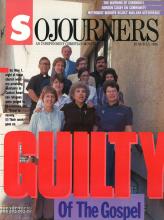JIM CORBETT started bringing Central American refugees into his home in 1981, after discovering that U.S. immigration officials regularly detained and deported them. Corbett shared his experiences with John Fife, and in 1982 the "underground railroad" became the public sanctuary movement. A Quaker and a Harvard-educated philosopher, Corbett was forced into early retirement from ranching by severe arthritis. —The Editors
Sojourners: What are your feelings about the trial?
Jim Corbett: The trial is thoroughly rigged. I don't think they could find another judge in the Ninth Circuit who would be as firmly against us and determined to gain a conviction at any cost as is Judge Earl Carroll. But even if we do get convicted this time, juries down the line will find out the truth.
The strategy that the government has had to rely on involves keeping the jury from discovering what is going on. The government has had to abandon all those tape recordings that were made and use as its star witness a person who is reporting on conversations in English that he admitted he couldn't understand very well. The government has done all that because it could not afford to let the jury discover what is happening. And I think that a strategy based on suppressing the truth is a flawed strategy.
What we're in the process of doing now is establishing a new tier of legal order, one that was mandated at the Nuremberg trials [of Nazi officials] but which has never been systematically established on any kind of institutional foundation. The institution in this case is the church, and the mandate is that communities and individuals are responsible for the defense of human rights, above all when their own government is violating human rights. Justice Robert H. Jackson, the chief U.S. prosecutor when the Nuremberg tribunals opened in 1945, emphasized that it's essential to hold ordinary citizens responsible for compliance with human rights and international law when their own government is in violation of those rights. As he pointed out, the only way states have of enforcing international law against one another, when you come right down to it, is through warfare. So if we're going to have a peacemaking expansion of the legal order to include an international legal order, we're going to have to rely on ordinary citizens in communities to do that.
Read the Full Article
